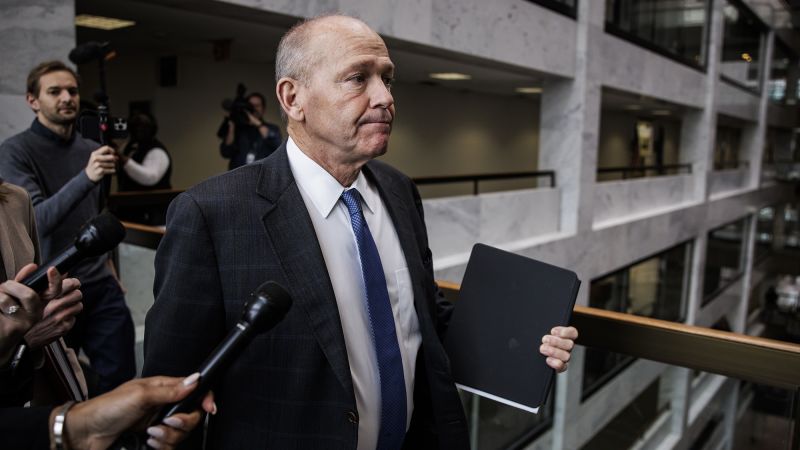Editor’s Note: A version of this story appeared in CNN Business’ Nightcap newsletter. To get it in your inbox, sign up for free, here.
The beauty of being a CEO in America is that when your company does well, you get extra money as a reward. And when your company does badly, you get extra money to encourage you to stick around and lead it through the storm. What a deal!
And at some point, you get to bow out and float toward retirement on your golden parachute, which means — you guessed it — more money.
That’s the dream awaiting Dave Calhoun, the CEO of Boeing, who is preparing to retire after four years at the helm, during which he failed to fix the company’s biggest problems around safety and quality control that burned its reputation with customers.
By the time he steps down at the end of this year, he’ll be 67 years old and poised to collect millions of dollars on top of the many millions he’s already made as CEO.
There’s a certain dark irony in Calhoun pulling the metaphorical ripcord now, while Boeing is flailing, though it’s hard to imagine a scenario in which he got to keep his job in the midst of cascading mishaps and near-disasters over the past three months.
Exactly how much Calhoun will receive isn’t clear yet, as it depends on how Boeing’s stock performs. A Boeing spokesperson said that details of his compensation will be shared in company filings in the coming weeks.
But we already know that Calhoun has made about $63 million over the past three years in total compensation, according to regulatory filings. That includes a $1.4 million base salary, plus millions in stock-based incentives.
According to Boeing’s most recent proxy statement, Calhoun is set to walk away with about $15 million worth of stock, cash and options in retirement. But that doesn’t account for incentives along the way that could boost his potential future earnings. One estimate, according to Fortune, suggests Calhoun could walk away with $24 million, with the potential to collect $45.5 million more if Boeing’s stock goes up 37%. That gives Calhoun a pretty hefty incentive to choose his successor carefully.
If history is any guide, Calhoun could have done a much worse job and still made out startlingly well.
His predecessor, Dennis Muilenburg, was fired over his mishandling of Boeing’s response to two crashes that killed 346 people. And while Muilenburg was denied severance pay, he still walked away with $80 million worth of stock and other assets.
Post-Muilenburg, the board tapped one of their own to take over.
Calhoun, an accountant by training and a longtime Boeing director, ascended as CEO in January of 2020 with a message that Boeing would be getting back to its roots and focusing on safety and quality.
The honeymoon period didn’t last long.
Even as the board heaped praise on Calhoun, Boeing’s own customers started sounding off about their frustrations with the leadership.
In 2022, the CEO of Ryanair said “Boeing management is running around like headless chickens,” and that executives needed an immediate “reboot, or a boot up the a**.” Around the same time, the head of aircraft leasing company Avalon said Boeing had “lost its way” and might need “fresh leadership.”
Under Calhoun, labor relations at Boeing have been badly frayed. The company laid off at least 16,000 employees in response to the pandemic, and moved production of the 787 Dreamliner from its unionized plant in Washington to a non-unionized plant in South Carolina. This summer, more than 30,000 Seattle-area mechanics are set to vote on a strike authorization that could result in a work stoppage when their contract expires in September.
Still, Calhoun has held on, thanks to a loyal board and a business model that makes it virtually impossible for Boeing to lose customers or go bankrupt. And once again, Boeing finds itself in a crisis, looking for a new leader to steer it to a safe landing.
—CNN’s Chris Isidore contributed reporting.
Read the full article here




